Bar association challenges judge’s assertion that PR stunt intended at ex-Hong Kong leader’s trial
Group’s statement stresses that members of the public have fundamental right to observe the due process of law

The Hong Kong Bar Association on Friday voiced concerns over a judge’s recent assertion that the presence of high-profile personalities at a former city leader’s trial was an “undesirable” public relations stunt.
The judge said the arrangement aimed to introduce Tsang’s apparent good character to the jury “through the back door” because direct evidence of his character could not for legal reasons be presented directly.
Faith, family and friends brought Donald Tsang comfort through his many trials
But the association argued there was no indication in the judgment that evidence had been cited to substantiate the judge’s observations.
“Nothing in the judgment indicates that any such party was invited to make representation to answer the allegation,” it said.
This is at the heart of the right of an accused person to have an open and transparent criminal process
The statement stressed that members of the public had a fundamental right to observe the due process of law, and they should not be restricted without a very strong and compelling reason, such as evidence showing an attempt to tamper with the jury, which “strikes at the very foundation of our criminal justice system and must be forcefully dealt with”.
“This is at the heart of the right of an accused person to have an open and transparent criminal process,” the statement read.